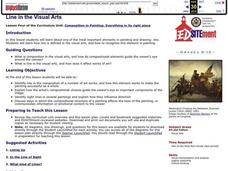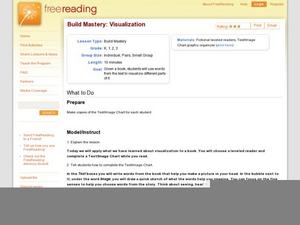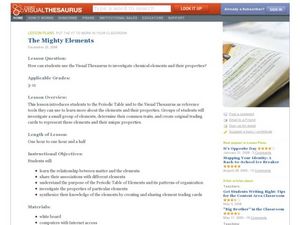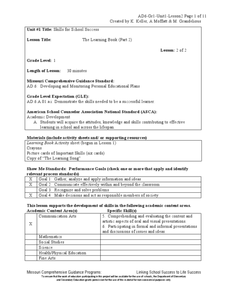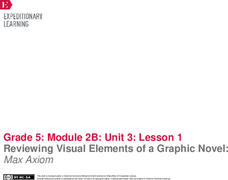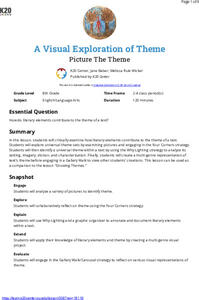K20 LEARN
OPTIC - A Reading Strategy Recipe: Visual Literacy
A visual literary lesson provides learners with OPTIC (Observations, Predictions, Themes, Inferences, Conclusions), a reading strategy to help them understand and interpret visual and written texts. Scholars practice the strategy with a...
EngageNY
Presenting a Research-Based Claim: Visual Aid and Peer Critique
Back to the drawing board. Scholars work on the visual to complement their claim presentations using the Criteria for the Cascading Consequences Chart Visual as a guide. They then practice their presentations with partners.
EngageNY
Mid-Unit Assessment: Analyzing Visual Elements in a Graphic Novel
Can I get a visual? Scholars work on their mid-unit assessments by analyzing vocabulary and discussing visual elements in Investigating the Scientific Method with Max
Axiom Super Scientist. They then reflect on their learning by...
Curated OER
What's in a Picture? An Introduction to Subject in the Visual Art
Learners discuss the subject and meaning of examples of visual art. They analyze various paintings found on the Metropolitan Museum of Art website, answer discussion questions, complete online interactive activities, and write an essay.
Curated OER
Visual Learning: Gone Fishing
Students complete visual learning activities using a photograph of a fisherman. In this photograph analysis lesson, students analyze the photograph and the facts within the picture. Students read a quote and caption for the photograph...
Curated OER
Portraits, Pears, And Perfect Landscapes: Investigating Genre in the Visual Arts
Differentiate between the various genres in the visual arts world, particularly in Western painting. Your class can view and discuss, in small groups, paintings published on the National Galleries website. Then each student individually...
Code.org
Good and Bad Data Visualizations
Good versus bad data. Pairs rate online collections of data representations from good to bad and then suggest ways to improve the visualizations. The class then creates a list of best practices and common errors in data representations...
Perkins School for the Blind
Learning to Express Myself
Expressing one's wants and needs is vital for learners of any age or ability level. Young children with visual impairments and intellectual disabilities practice asking for preferred items, foods, or activities in a structured manner....
Museum of Disability
Taking Visual Impairment to School
What is the world like when you can't see, or when your vision is impaired? Learn about how Lisa communicates with the world around her with Taking Visual Impairment to School by Rita Whitman Steingold. Learners answer discussion...
Curated OER
Follow the Leader: Line in the Visual Arts
Students explore line in painting and drawing and examine how it is defined in the visual arts. Recognizing line in the composition of a number of art works and how it affects these works of art is the focus of this lesson.
Curated OER
Basic Visual Language Ii: How To Analyze a Visual Text
Students identify techniques used to communicate visually. They compare and contrast different visual techniques found in mass media. They apply their understanding by creating photographs that use a variety of visual literacy techniques.
Curated OER
Build Mastery: Visualization
What do you see? Young reader tap into the visualization process as they listen to or read a fiction story and fill out a graphic organizer. Model this first with a think-aloud, showing scholars how you visualize a familiar story. For...
Curated OER
The Mighty Elements: Using the Visual Thesaurus to Investigate Chemical Elements
Pupils create trading cards for elements in the Periodic Table. Initially, they are introduced to the Periodic Table of Elements and the concept of elements in the world around us. After dividing into groups, learners use the Visual...
EngageNY
Building Background Knowledge: Learning About the Historical and Geographical Setting of Esperanza Rising (Chapter 1: “Aguascalientes, Mexico, 1924”)
Set up your class to read Esperanza Rising, by Pam Muñoz Ryan, through a class read-aloud and exploration of the setting. The detailed instructional activity outlines each step. First, class members read over the first few pages and...
Perkins School for the Blind
Learning to Identify Sounds Made by the Body
Sneeze, snap, tap, and whistle; Did I do that? Explore the parts and sounds of the human body with your learners with visual impairments. First you'll name the parts of the body, make a sound with each part, and then have the class guess...
Curated OER
Looking and Learning in the Art Museum
Have you just visited an art museum? Or can you create a gallery in your classroom to visit? Pupils create an original drawing that reinforces what was learned in a visit to the art museum. They will view original art work and verbally...
Curated OER
The Learning Book (Part 2)
First graders examine and discuss the skills needed to be an effective learner. They sing "The Learning Song" to the tune of London Bridge is Falling Down, and complete a Learning Book activity sheet. Each student draws a picture of the...
Teach Engineering
Let's Learn About Spatial Viz!
Can you see your class working on spatial visualization? The first installment of a five-part module introduces the concept of spatial visualization and provides a 12-question diagnostic assessment to test spatial visualization skills....
EngageNY
Reviewing Visual Elements of a Graphic Novel: Max Axiom
Pass the tea! Using the resource, scholars participate in a Tea Party protocol to analyze text and images about inventions that helped meet societal demands. After sharing their observations with each other, they discuss visual elements...
Healthy Native Youth
Chapter 4: Learning About Disease
Communicable diseases are the focus of a lesson that primarily uses discussion, a hands-on activity, and a worksheet to drive their point home. Lotion and glitter create a strong visual for communicable diseases. A practice page provides...
K20 LEARN
A Visual Exploration Of Theme: Picture The Theme
"What is the theme of this story?" Now there's a question that can strike fear in the hearts of learners. Here's a lesson that uses photographs to introduce the concept of theme. Scholars examine six photographs and then attach a theme...
Curated OER
Learning How to Sing Rounds
Learn about rounding by reciting songs alongside classmates, discovering the difference between singing together and singing in canon. In this musical lesson, young scholars discover what a "round" is and the melodic effect it can have...
Curated OER
Visual Learning: Are You Really What You Wear?
Students analyze a photograph to complete a visual learning activity. In this visual learning lesson, students analyze the photograph and follow step process to identify the facts within the picture. Students analyze the photo caption...
EngageNY
Editing Sentences and Creating Visual and Multimedia Displays for a Presentation
Let's get visual. Pupils plan visual displays to accompany their upcoming opinion speech presentations. Additionally, they practice editing sentences for clarity before revising their speech drafts.











